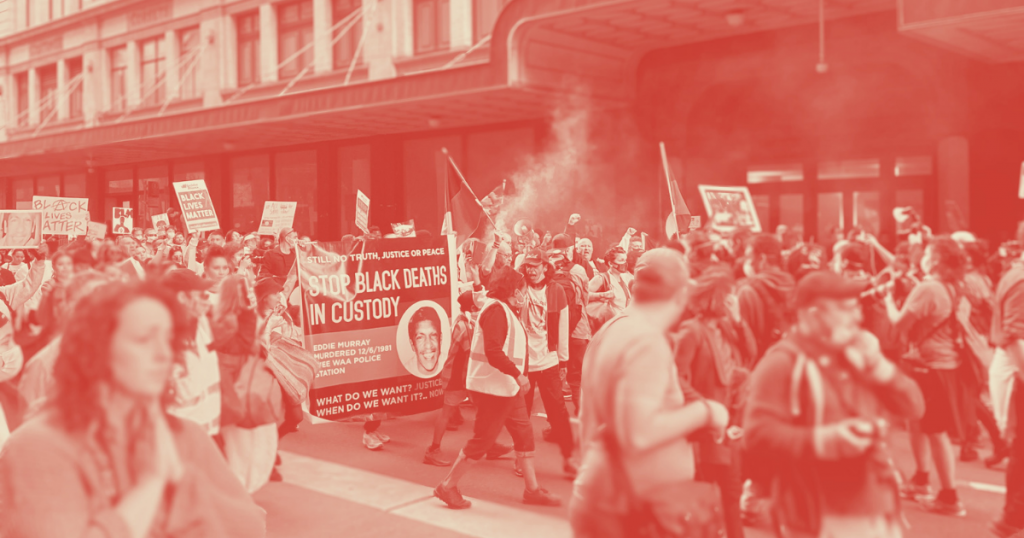In a disturbing turn of events, new anti-protesting laws mean the NSW Government has essentially criminalised any protests that don’t have NSW Police approval.
The new, repressive measures deliberately target protesters, who are often in opposition to the Government’s views.
Everyone from school children marching for climate action, to anti-war protestors can face up to two years in jail and a $22,000 fine.
The law passed, with Labor’s support, despite calls from a coalition of almost 40 civil society organisations to scrap the bill.
Police already have enough power
Police already have relevant powers to handle dangerous or unsafe protesting. Officers have the power to move on protesters and detain them for failing to comply with directions if they are blocking traffic. There are further powers to detain people who are causing a riot, interfering with a mine or blocking a railway.
Limits are already in force in NSW thanks to the following acts:
- Summary Offences Act 1988,
- Crimes Act 1900,
- Inclosed Lands Protection Act 1901,
- Forestry Act 2012,
- Mining Act 1992, and
- Law Enforcement (Powers and Responsibilities) Act 2002.
Anti-protesting laws straight out of Orwell’s 1984
Greens MP Abigail Boyd believes the NSW Government has squashed the democratic right to protest.
“The NSW government has gotten drunk on power and has written legislation that seeks to curtail the right to political speech and the right to peaceful assembly in this state,” she said.
“Nobody likes to be criticised, but that doesn’t mean you get to imprison those who speak out against you.”
Aboriginal Legal Service Limited Chairperson Mark Davies says the new measures specifically impact First Nations people.
“The Aboriginal Legal Service was born out of a protest movement in the 1970s,” Mr Davies said.
“You would be hard pressed to find any win for Aboriginal and Torres Strait Islander peoples’ rights that wasn’t brought about by public protest.”
“The right to assemble and demonstrate in our streets, towns and cities is a fundamental cornerstone of democracy. For marginalised communities, public protests enable us to be seen and heard, even – and especially – when those in power would rather suppress our voices.
Greens MP David Shoebridge has concerns over the impact these new regulations will have on both First Nations people and climate protestors.
““These laws have been written with the clear intent of jailing the Government’s opponents. We know they will have an especially harsh impact on First Nations and climate protests.”
“Police don’t like protests, especially when these protests are against police brutality and the racism of the justice system. Asking for their consent is seriously Orwellian,” Mr Shoebridge said.
Are the laws unconstitutional?
The legal basis of the right to protest in NSW is the common law right to peaceful assembly. This has its origins in the Magna Carta.
The right has further protection by the Australian Constitution under the implied freedom of political communication. However, it is somewhat unclear about how many restrictions can go on that freedom before they become unconstitutional.
NSW Council for Civil Liberties President Pauline Wright has concerns about the new laws.
“It’s shocking that a law threatening peaceful protesters with significant fines has been passed in Australia in 2022,” she said.
“In a liberal democracy, the government should welcome citizens expressing their views, not try to ban it.”
“This law is an outrage, but it isn’t the end of the road – we fought for protest rights in the 70s and won, and we’ll do the same now.”
Rich history of protests at Town Hall
The regulations extend to any protest that occurs on a main road in NSW. This includes infamous protest routes such as George Street, Oxford Street, Lee Street and Taylor Square.
The NSW Police now have the power to veto any protests which they do not agree with.
In 2020, NSW Police infamously denied protestors the requisite authority to march for #BlackLivesMatter. O’Brien Criminal & Civil Solicitors fought for organisers in the Supreme Court, which granted a last minute clearance on the march.
No other comparable country with democratic traditions gives the police veto powers over protests.
Anti-protesting laws mean NSW Police can veto all protests

The new road regulations essentially prohibit all street politics, marches and rallies in NSW that don’t receive sign off from NSW Police. This includes:
- practically every road in NSW including all “main roads”, all highways, freeways, and toll roads, and
- Applies to every bridge or tunnel in Sydney, Newcastle or Wollongong, as well as any bridge or tunnel connecting onto practically any road in NSW.
The Crimes Act Regulations have amendments so that you will now need explicit police approval to gather at or near Town Hall. This would have seen attendees at actions like the recent Black Lives Matter rally in 2020 facing 2 years imprisonment and/or a $22,000 fine.
This also applies to all metropolitan train stations, ferry and cruise terminals, Lucas Heights Nuclear reactor, power stations and major distribution centres.
Sarah is a civil solicitor who primarily practices in defamation, intentional torts against police, privacy and harassment.
- Sarah Gorehttps://obriensolicitors.com.au/author/sarahg/
- Sarah Gorehttps://obriensolicitors.com.au/author/sarahg/
- Sarah Gorehttps://obriensolicitors.com.au/author/sarahg/
- Sarah Gorehttps://obriensolicitors.com.au/author/sarahg/





